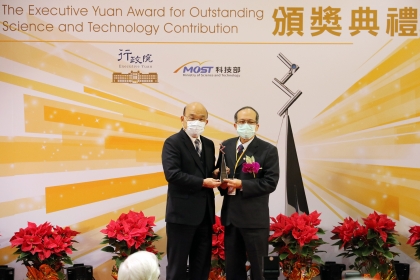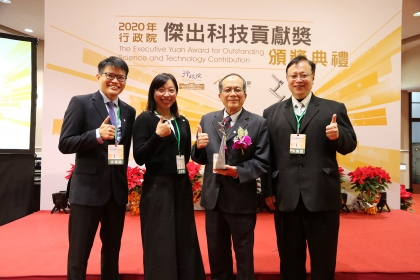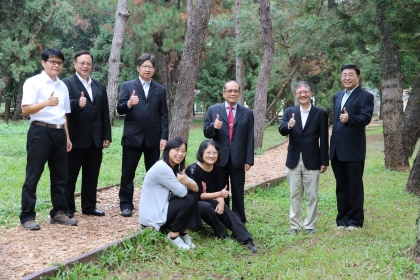Vice President Jenn-Wen Huang of NCHU Won the Executive Yuan Outstanding Science and Technology Contribution Award
2021-02-04
興新聞張貼者
Unit秘書室
2,627
Jenn-Wen Huang, a Distinguished Professor in the Department of Plant Pathology and Vice President of National Chung Hsing University, comes from a peasant family and has worked with the microorganisms for 45 years. He has made outstanding achievements in the three areas of the research: 1) development of agricultural waste reuse and regeneration; 2) microbial products exploitation; and 3) microbial protein for controlling plant diseases. His research concentrates on how to improve plant disease control via the non-pesticide strategies. On December 25, 2020, he was awarded the "2020 Executive Yuan Outstanding Science and Technology Contribution Award".
In 1972, Jenn-Wen Huang was admitted to the Department of Plant Pathology of National Chung Hsing University. In the second semester of his junior year, he joined the member of Plant Disease Management Laboratory supervised by Professor Shou-Kung Sun, to study the ecology and control of Fusarium oxysporum f. sp. niveum, the causal agent of watermelon fusarial wilt. During the period, he worked closely with Prof. Sun to investigate the crop diseases and collect the specimens at the different farm fields in Taiwan. Through the studies, Dr. Huang has learned the technology of plant disease diagnosis and management, and opened the door for him to enter the field of plant pathology.
After graduation, Jenn-Wen Huang worked as a teaching assistant and lecturer at National Chung Hsing University. During this period, professor Sun and he successfully invented the "S-H Soil Amendment" using the agricultural and industrial wastes such as the rice, bagasse, oyster shell powder, and mineral ash, becoming the first in Taiwan to begin to use soil amendment for controlling soilborne plant diseases. A few years later, the patented formula of the "S-H Soil Amendment" was technologically transferred to the manufacturer for NT$ one million. At that time, Professors Sun and Huang immediately donated the technology transfer funds to the society as a feedback and established the Plant Pathology Education Foundation, which was then registered and renamed "Minsheng Science Technology and Education Foundation", serving to help the students in the Department of Plant Pathology. Professor Shou-Kung Sun's hands-on research attitude and selfless demeanor of supporting the younger generations have a profound influence on Jenn-Wen Huang.
For decades, Jenn-Wen Huang has taken the microbial protection agents he developed into the fields, teaching the farmers the concept of the integrated plant disease management. "Each crop disease has a key time point for the prevention and control. Make the spraying treatment at the right time, and then match the plant probiotics to make the crops stronger and we can naturally achieve the chemical pesticide reduction."
In recent years, Jenn-Wen Huang has actively integrated the university team to cooperate with the Agricultural Technology Research Institute and the industry, and invested in the research and development of the environmentally friendly materials to promote the cross-field application of the microorganisms. In 2019, he called on the plant protection experts to jointly publish “Handbook of Eco-friendly Products for Plant Health Care”, providing the farmers with the systematic and friendly cultivation techniques, and all the royalties were donated as the National Chung Hsing University Xingyi Scholarship to support the economically disadvantaged students to learn. He has now authorized 6 companies for the mass production and sales of the "Bacillus mycoides" product developed by his team. Among them, the "Shenzhenshui No. 2" cooperating with Sinon Corporation has accumulated a turnover of about NT$150 million in Taiwan in the past five years. At present, the team is also cooperating with the Agricultural Technology Research Institute to apply the microbial preparations to the livestock and aquatic products. The growth of the animals and plants is significantly better than the control group.
"One person's power is limited, and sharing can exert the greater value." It is his philosophy to lead the team by gathering everyone's strength and finding the best people to help. Jenn-Wen Huang believes that Taiwan has abundant R&D capabilities, and the industry does not have to buy the licenses from abroad. He will continue to gather the domestic industry-university-research institute resources and lead the young teams to invest in more forward-looking and sustainable research, so that the industry can produce the excellent products, and the farmers have the good materials to use. Just like Professor Shou-Kung Sun leading him, Dr. Huang said “one baton passes after another, we work hard together for the sustainable development of Taiwan's agriculture.”
In 1972, Jenn-Wen Huang was admitted to the Department of Plant Pathology of National Chung Hsing University. In the second semester of his junior year, he joined the member of Plant Disease Management Laboratory supervised by Professor Shou-Kung Sun, to study the ecology and control of Fusarium oxysporum f. sp. niveum, the causal agent of watermelon fusarial wilt. During the period, he worked closely with Prof. Sun to investigate the crop diseases and collect the specimens at the different farm fields in Taiwan. Through the studies, Dr. Huang has learned the technology of plant disease diagnosis and management, and opened the door for him to enter the field of plant pathology.
After graduation, Jenn-Wen Huang worked as a teaching assistant and lecturer at National Chung Hsing University. During this period, professor Sun and he successfully invented the "S-H Soil Amendment" using the agricultural and industrial wastes such as the rice, bagasse, oyster shell powder, and mineral ash, becoming the first in Taiwan to begin to use soil amendment for controlling soilborne plant diseases. A few years later, the patented formula of the "S-H Soil Amendment" was technologically transferred to the manufacturer for NT$ one million. At that time, Professors Sun and Huang immediately donated the technology transfer funds to the society as a feedback and established the Plant Pathology Education Foundation, which was then registered and renamed "Minsheng Science Technology and Education Foundation", serving to help the students in the Department of Plant Pathology. Professor Shou-Kung Sun's hands-on research attitude and selfless demeanor of supporting the younger generations have a profound influence on Jenn-Wen Huang.
For decades, Jenn-Wen Huang has taken the microbial protection agents he developed into the fields, teaching the farmers the concept of the integrated plant disease management. "Each crop disease has a key time point for the prevention and control. Make the spraying treatment at the right time, and then match the plant probiotics to make the crops stronger and we can naturally achieve the chemical pesticide reduction."
In recent years, Jenn-Wen Huang has actively integrated the university team to cooperate with the Agricultural Technology Research Institute and the industry, and invested in the research and development of the environmentally friendly materials to promote the cross-field application of the microorganisms. In 2019, he called on the plant protection experts to jointly publish “Handbook of Eco-friendly Products for Plant Health Care”, providing the farmers with the systematic and friendly cultivation techniques, and all the royalties were donated as the National Chung Hsing University Xingyi Scholarship to support the economically disadvantaged students to learn. He has now authorized 6 companies for the mass production and sales of the "Bacillus mycoides" product developed by his team. Among them, the "Shenzhenshui No. 2" cooperating with Sinon Corporation has accumulated a turnover of about NT$150 million in Taiwan in the past five years. At present, the team is also cooperating with the Agricultural Technology Research Institute to apply the microbial preparations to the livestock and aquatic products. The growth of the animals and plants is significantly better than the control group.
"One person's power is limited, and sharing can exert the greater value." It is his philosophy to lead the team by gathering everyone's strength and finding the best people to help. Jenn-Wen Huang believes that Taiwan has abundant R&D capabilities, and the industry does not have to buy the licenses from abroad. He will continue to gather the domestic industry-university-research institute resources and lead the young teams to invest in more forward-looking and sustainable research, so that the industry can produce the excellent products, and the farmers have the good materials to use. Just like Professor Shou-Kung Sun leading him, Dr. Huang said “one baton passes after another, we work hard together for the sustainable development of Taiwan's agriculture.”




